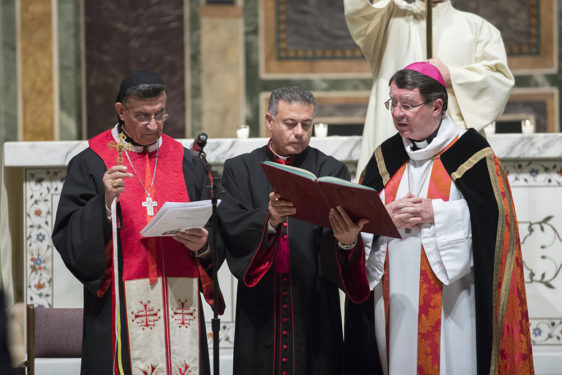
By Christopher White
The Tablet National Correspondent
In a lecture at the Catholic University of America in Washington, D.C. on Thursday, the Apostolic Nuncio to the United States, Archbishop Christophe Pierre, praised the “open and honest dialogue” Pope Francis has brought to the Church and said “unity prevails over conflict.”
Pierre’s remark came during the 11th annual McManus lecture hosted by the university’s School of Canon Law, and incidentally, just one day after the U.S. bishops reaffirmed their fidelity to Pope Francis following the resignation of Father Thomas Weinandy, an advisor to the bishops’ committee on doctrine who had criticized the pope for causing “chronic confusion” within the Church.
The nuncio’s lecture, “Synodality and Pope Francis: The Church that Walks Together,” focused on the ways in which Pope Francis’ emphasis on synodality contributes to the “ecclesial renewal desired by the (Second Vatican) Council.”
Pope Francis named Archbishop Pierre as apostolic nuncio to the United States in April 2016. He has worked for the Holy See’s diplomatic services since 1977, having previously served in Uganda, New Zealand, and most recently Mexico, among numerous other countries.
The archbishop said that Pope Francis’ focus on the concept of synodality – listening to people’s concerns, and making decisions on a local level – is “something new and vital to the Church of our day and that this has deep theological roots, and which involves the spirituality of listening and discernment.”
“Synodality,” he said, “is best understood as a lived experience, a way of being the Church and can be lived at every level of the Church offering the faithful a sense of shared responsibility for her mission. A synodal Church is a Church that walks together.”
Archbishop Pierre traced the origins of synodality to the Council of Jerusalem in AD 50 when the early Church “wrestled with the influx of Gentiles and the dictates of the law.” The apostles and elders engaged in consultation with one another and listened to the Holy Spirit before reaching a consensus on pressing matters facing the Church. Archbishop Pierre said this first council or synod, evidenced the “reciprocity of charisms,” and provided a forum to incorporate various voices and gifts into the life of the Church.
He said that the Second Vatican Council considered this first century model and endorsed synodality as “a way of living the faith” where all members of the Church are engaged in its mission.
Archbishop Pierre said that Pope Francis believes Synodality has a dialogical structure, involving both speaking and listening. He cited both the 2014 and 2015 synods on the family called by Pope Francis in which he encouraged open debate and discussion.
“Synodal listening is an affirmation of each person’s dignity and is an expression of respect for the voices, legitimate desires, problems, and sufferings of the people of God,” said Archbishop Pierre.
He acknowledged that while recent “synods have not been without tensions . . . conflict and even criticisms,” he expressed his confidence that the end result can yield “truly pastoral solutions to complex problems.”
Pope Francis, he said, believes the synod process cannot lose sight of both the “profound unity of the Church and of reality.”
The archbishop, however, used his remarks to warn against those who want to use such processes to further their own agendas or to promote discord.
“There will be a temptation when one’s point of view does not prevail to simply walk away from the process and to create useless and unnecessary conflict,” he said.
Instead, he encouraged a “deepening of a sense of solidarity with others engaged in the process” and “contemplating Christ who reconciled all things in himself.” The synod process should ultimately lead to a “harmonizing of diverse perspectives to overcome conflict,” said Archbishop Pierre.
He also argued that the synodal process was deeply sacramental. The shared baptism of believers allows for equals to work together toward communion. “Synodality is the way of putting communion into work,” he claimed.
For those that would dismiss the process as another bureaucratic mechanism of the Church, he explained that it is, instead, part of the Church’s evangelical mission. “A synod is not the same thing as a meeting or a lively discussion seeking to find a resolution,” he warned. “Rather it is an event open to the spirit.”
While praising the spiritual benefits of synodality, Archbishop Pierre said it could produce a number of practical outcomes, including a “healthy decentralization” at all levels of the Church, resulting in greater deference to local bishops, priests, and even parish councils.
“Involving the laity is by no means an abdication of authority,” he added, but part of a mindset of shared responsibility that Pope Francis wants to foster within the Church. “The involvement of all the faithful in the synodal process in helping the Church to be a synodal Church helps the Church to be more fully and spiritually alive,” he said.
Archbishop Pierre – who is the pope’s personal representative to the United States – concluded his remarks by praising Pope Francis for moving the work of the Second Vatican Council forward in the third millennium.
“The election of Pope Francis – the pope who has promoted this spirituality of synodality and discernment – is a sign of the times,” he said.
“A more widespread appreciation of synodality in the Church will increase the joy of the gospel which fills the hearts of believers.”
